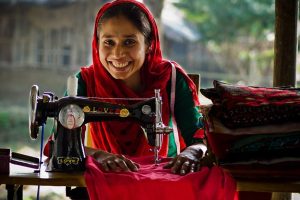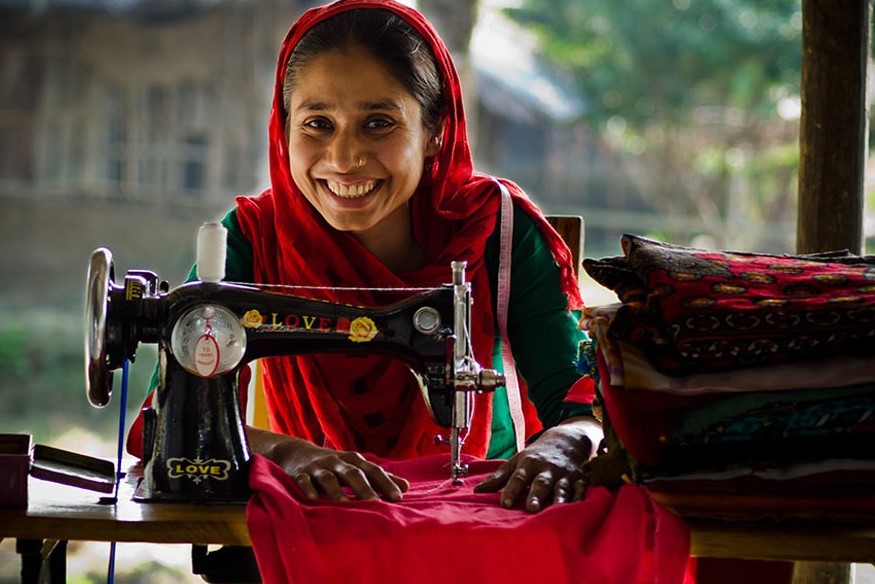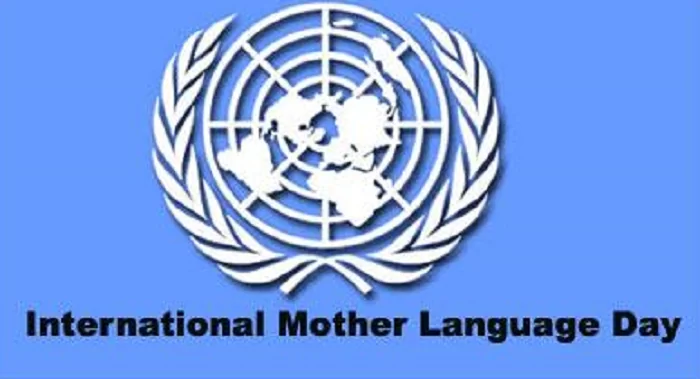Women Empowerment: In Bangladesh, a transformative wave of women’s empowerment is reshaping the societal, economic, and political landscapes. This movement is not just about achieving gender equality; it’s about unlocking the vast potential of half the nation’s population to contribute to its development and prosperity. Women’s empowerment in Bangladesh is a multifaceted endeavor, encompassing education, healthcare, economic independence, and political representation. It is about breaking the chains of traditional limitations and paving the way for a future where women can stand shoulder to shoulder with men, not just as beneficiaries of change but as agents of progress. This journey of empowerment is fuelled by the belief that when women thrive, society as a whole prospers. From the bustling streets of Dhaka to the serene villages in the countryside, the stories of empowered women inspire change and foster a more inclusive and equitable Bangladesh.
Education: The Foundation of Empowerment
In Bangladesh, education has emerged as a cornerstone for empowering women, and transforming their lives and communities. The government’s dedication to achieving gender parity in education has led to remarkable achievements, with girls now having equal access to education at primary and secondary levels. Initiatives such as stipends for girls and the establishment of schools in rural areas have played a pivotal role. The story of Taslima Miji, who, empowered by a government stipend, pursued higher education and became a teacher, embodies the transformative impact of education on women empowerment.
Healthcare
Advancements in healthcare have significantly contributed to the empowerment of Bangladeshi women. Efforts to reduce maternal and infant mortality rates, enhance access to healthcare, and promote family planning have borne fruit, thanks to government prioritization of reproductive health services. Dr. Rubina Islam’s dedication to providing quality medical care to women in rural areas exemplifies the profound impact of improved healthcare on women’s lives.
Economic Participation
Economic empowerment is crucial for the overall empowerment of women. Bangladesh has seen a surge in women’s entrepreneurship, supported by government initiatives like microfinance programs and skill development training. Fahmida Akhter’s success story, where she utilized microfinance initiatives to start a handicraft business, highlights how economic empowerment can foster financial independence and inspire community-wide progress.

Political Women Empowerment
The political landscape in Bangladesh has evolved to include more women in decision-making roles, thanks to measures such as reserved seats in local government. The leadership of Prime Minister Sheikh Hasina exemplifies the influence women can wield in shaping national policies and advocating for women empowerment. Her tenure has seen notable advancements in socioeconomic indicators, with a strong focus on elevating women’s roles in society.
Combating Gender-based Violence
Addressing gender-based violence and discrimination is essential for true empowerment. Bangladesh has taken significant strides in this direction, establishing helplines, shelters, and legal reforms to protect women. The Acid Survivors Foundation, initiated by Jahanara Imam, stands as a testament to the resilience in combating violence against women, offering support, rehabilitation, and raising awareness about the consequences of such atrocities.
The Journey Continues of Women Empowerment
The strides made in empowering women in Bangladesh signify a journey of progress and resilience. From education and healthcare to economic and political participation, Bangladeshi women have carved paths of success, influencing various aspects of society. Despite the challenges that remain, the ongoing efforts and achievements pave the way toward a future where women’s empowerment is the norm, ensuring a more inclusive and prosperous society for all.
FAQs on Women Empowerment in Bangladesh
What are the key factors driving women’s empowerment in Bangladesh?
Education, healthcare, economic participation, political representation, and combating gender-based violence are key drivers of women’s empowerment in Bangladesh. Initiatives and policies in these areas have collectively contributed to significant advancements.
How has education contributed to women’s empowerment in Bangladesh?
Education has played a crucial role by providing women with the knowledge, skills, and confidence needed to engage in societal participation. Initiatives like government stipends for girls’ education and the establishment of schools in rural areas have ensured greater access to education.
What role does economic empowerment play in the lives of Bangladeshi women?
Economic empowerment, through entrepreneurship and employment opportunities, has enabled Bangladeshi women to achieve financial independence, contribute to the national economy, and inspire others in their communities to pursue economic activities.
How is political empowerment manifested among women in Bangladesh?
Women’s political empowerment in Bangladesh is evidenced by increased participation in political processes, representation in leadership roles, and the implementation of gender-sensitive policies, facilitated by measures like reserved seats for women in local government.
What measures have been taken to combat gender-based violence in Bangladesh?
Bangladesh has established helplines, shelters, and legal reforms, alongside awareness campaigns and educational initiatives, to combat gender-based violence. Organizations like the Acid Survivors Foundation have played a significant role in supporting victims and raising public awareness.
The empowerment of women in Bangladesh serves as an inspiring model of progress, illustrating the profound impact of collective efforts across various sectors. As Bangladesh continues to navigate the challenges and opportunities ahead, the journey of empowering women remains a beacon of hope and a testament to the potential for transformative change.
Progress made:
- Education: Significant advancement in girls’ education with near gender parity in primary and secondary schools.
- Health: Reduction in maternal and infant mortality rates, increased access to healthcare, and promotion of family planning.
- Economic Participation: Growth in women’s entrepreneurship through microfinance programs and skills development training.
- Political Representation: Increased participation in local government with reserved seats for women, leading to more female leaders.
Individuals contributing to the progress:
- Taslima Miji: A teacher who overcame obstacles to receive education and now empowers young women in her community.
- Dr. Rubina Islam: A physician ensuring quality healthcare for women in rural areas, improving maternal mortality rates.
- Fahmida Akhter: A businesswoman who used microfinance to build a handicraft business, empowering other women through employment.
- Sheikh Hasina: The Prime Minister who prioritizes women’s empowerment in national policies.
- Jahanara Imam: Founder of the Acid Survivors Foundation, providing support and raising awareness about violence against women.
Challenges remaining:
- Gender-based violence: Addressing violence, discrimination, and harmful social norms that hinder women’s advancement.
Frequently Asked Questions (FAQs) on Women Empowerment in Bangladesh
Q1: What does women empowerment in Bangladesh entail?
A1: Women empowerment in Bangladesh involves improving and enhancing the social, economic, political, and legal strength of women, ensuring equal rights to women, and making them confident enough to claim their rights, such as freely live their life with a sense of self-worth, respect, and dignity; have complete control of their life, both within and outside of their home and workplace; and make their own choices and decisions.
Q2: How significant is education in the empowerment of women in Bangladesh?
A2: Education plays a pivotal role in the empowerment of women in Bangladesh. It provides women with the knowledge, skills, and self-confidence necessary to participate fully in the development process. Initiatives like stipends for girls’ education, gender-sensitive educational materials, and increased access to schools in rural areas have contributed significantly to achieving gender parity in education.
Q3: What strides have been made in healthcare for empowering women in Bangladesh?
A3: Significant strides in healthcare have been crucial for women’s empowerment in Bangladesh. Efforts to reduce maternal and infant mortality, increase access to reproductive health services, and promote family planning have markedly improved women’s health outcomes. These initiatives ensure women’s well-being, enabling them to participate more fully in society.
Q4: How does economic empowerment affect women in Bangladesh?
A4: Economic empowerment is transformative for women in Bangladesh, offering them opportunities for financial independence, entrepreneurship, and participation in the workforce. Government and NGO initiatives supporting microfinance, skill development, and entrepreneurship have enabled women to start their own businesses, contribute to the household income, and play a significant role in the national economy.
Q5: Can you explain the political empowerment of women in Bangladesh?
A5: Political empowerment in Bangladesh has seen women achieve greater representation and influence in governance and decision-making processes. Measures such as reserved seats for women in parliament and local government bodies, along with the election of female leaders to significant political positions, including the Prime Minister, have helped ensure women’s voices are heard in the political arena.
Q6: What actions have been taken to combat gender-based violence in Bangladesh?
A6: To combat gender-based violence, Bangladesh has implemented several measures, including establishing helplines and shelters for victims, legal reforms to protect women’s rights, and public awareness campaigns to challenge societal norms contributing to violence against women. Organizations like the Acid Survivors Foundation have been instrumental in providing support and rehabilitation to victims, highlighting the issue’s severity and advocating for change.
Q7: What challenges remain in the path to women’s empowerment in Bangladesh?
A7: Despite significant progress, challenges remain, such as persistent gender-based violence, discrimination, and societal norms that limit women’s roles and opportunities. Economic disparities and access to education and healthcare in rural areas also pose obstacles. Ongoing efforts to address these challenges are crucial for further advancements in women’s empowerment.
Q8: How can individuals contribute to furthering women’s empowerment in Bangladesh?
A8: Individuals can contribute by advocating for gender equality, supporting policies and programs that promote women’s rights, volunteering with organizations working for women’s empowerment, and challenging societal norms that perpetuate discrimination. Educating oneself and others about the importance of women’s empowerment and encouraging female leadership in all spheres of life can also make a significant difference.
Overall, the text paints a picture of progress amidst ongoing efforts. It emphasizes the collective action of various individuals, institutions, and policies driving the empowerment of women in Bangladesh, paving the way for a more inclusive and prosperous future.




